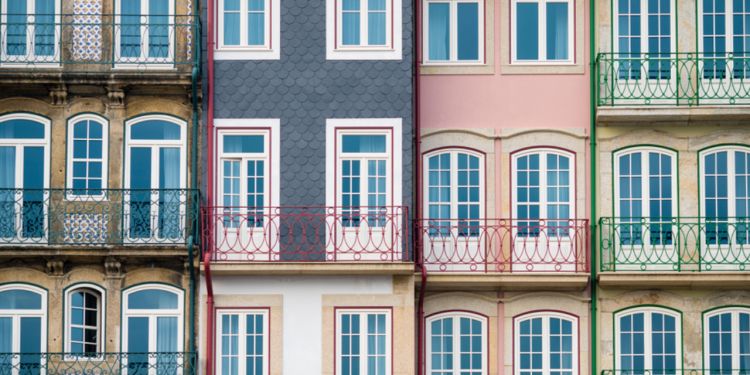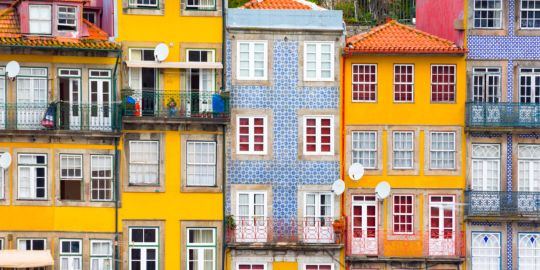Buying property in Porto

In the last decade, Portugal has become an important destination for culture and investment in Southern Europe. While a lot of attention is focused on the country's capital, Lisbon, Porto has emerged as a dynamic and highly promising alternative.
A lot of expats pick Porto as the city to settle in. Housing prices in Porto, though experiencing a steady rise, are substantially lower than in Lisbon, with the country's second city providing a highly developed infrastructure, a vibrant community and, basically, everything you need for an active modern lifestyle.
However, Porto's popularity has also come at a cost, resulting in the highest property prices ever recorded. Since January 2015, the average square meter price in the metropolitan area has gone up from 994€ to a staggering 2,500€. In the city center, in neighborhoods like Cedofeita, Santo Ildefonso, Sé and São Nicolau, property prices have risen to 3,865€ per square meter (July 2023 figures), an extraordinary 160% leap in only 8 years!
With an intense demand flooding Porto's real estate market, one should expect a higher focus from local authorities on bigger transactions in order to avoid tax evasion and market speculation by both buyers and sellers. Because of the recent shortage of affordable housing options for locals, there has been a fierce political debate about the subject in the last couple of years. As a result, laws on buying and renting properties, as well as the legal obligations of both tenants and landlords, are continually changing.
Investing in property in Porto
The housing market in Porto (and Portugal as a whole) is doing quite well for investors, with property prices consistently moving up over the last 10 years.
However, social unrest is rising due to the fact that people are no longer able to buy or rent accommodation in the cities they work/study in. In order to tackle this urgent issue, the local government is pushing for a new set of measures dedicated to solving the housing crisis that is currently plaguing the country. As part of this new policy, the Golden Visa Scheme has been terminated in Porto, which means foreign investors can no longer live legally in the country and apply for citizenship after 5 years just for buying 500,000€ worth of property in the capital. Furthermore, this new legislation to tackle speculation and high prices has deemed it illegal to open up new Airbnbs in Lisbon and Porto, so you won't be able to rent your property to tourists (legally) if you're away from the city.
However, in what is arguably the most controversial proposition on the package, the government is also considering coercive leasing for properties that have been empty for at least one year with no proof of utility payments. Although its application is still shrouded in mystery, technically, owners can be served a notice stating that their property will be forcibly rented to a local family (for a sum deemed adequate by local authorities) if the house or apartment has been vacant for a long time.
However, if you're sole interest as an investor is to flip houses fast, you'll be happy to hear real estate prices in Porto continue to rise, with property prices in the metropolitan area going up by almost 8% over the past 2 years. On the downside, transaction costs associated with purchasing property in Porto are quite high. You should expect to pay the IMT (tax over property transactions), stamp duty, the cost of the House Deed, and, if you need to rely on a loan, the respective banking fees ( stamp duty). As an example, if you want to buy an apartment for 250,000€ and do not need financing, expect to pay 7,955€ for IMT, plus 2,000€ of stamp duty (0,8% of the total sale) and around 1,000€/1,500€ for the House Deed. If you need a bank loan for 80% of the purchase value (the highest cap in Portugal), then you should add 1,200€ (0.6% stamp duty for a 200,000€ loan) to the tally.
If it's the other way around and you're trying to sell property in Porto, you should expect to pay real estate agent fees (usually 5% of the sale value), value-added tax over those fees (23% VAT) and other related legal fees. Plus, if you don't invest your capital gains into another property, you will have to pay income tax (IRS) over 50% of the amount you made. For example, if you had initially bought your property for 200,000€ and are now selling it for 250,000€, you've had a capital gain of 50,000€. However, you can deduct repairs, maintenance expenses and real estate agent fees. For simplification purposes, let's assume you never had any other deductible expenses besides the agent fees (5% of 250,000€ = 12,500€). This sum will be deducted from the initial 50,000€, bringing your capital gains down to 37,500€. As mentioned above, the IRS will only be applicable to 50% of your gains, which means 18,750€ will be subjected to tax. If you are a legal resident and pay your taxes in Portugal, the amount you will effectively pay will depend on your other sources of income and annual deductions, with current tax brackets ranging between 14.5% and 48% (for higher-income households/individuals). However, if you're living in another EU country, an additional 5% will be added to your bracket as a “solidarity tax”. Finally, if you live and pay taxes outside the EU, then you will have to pay a 28% flat tax over 100% of your capital gains: in this case, you'd pay 10,500€ (37,500 * 28%) just in taxes for selling your property.
Property prices in Porto
Houses in Porto have seen their prices and investment value skyrocket in the past few years. Some experts are actually talking about the possibility of a housing bubble that could possibly burst into a terrible crisis for the entire country. Be that as it may, demand keeps on rising, and so do prices. According to Portuguese real estate website Idealista, the price per square meter in the downtown area (city center) rose to almost 4,000€ in July 2023. Considering the entire metropolitan region, the average price per square meter drops to 2,483€, though it has gone up 60% over the past five years.
Needless to say, location is critical when talking about prices! In Ramalde, Paranhos or Campanhã, for example, which are located right outside the city center, the average square meter price stands at around 2,800€, while the areas where the middle-class lives, such as Matosinhos (excluding the seaside area) or Maia, can still offer a good bargain for budget-savvier expats (2,000€ per square meter, depending on the neighborhood).
A little further away from the downtown area, on the opposite side of the Douro River, Vila Nova de Gaia is basically a completely different city composed of dozens of different municipalities. Today, it stands as one of the country's finest examples of a dormitory town, with most people working in Porto and commuting back after work. Because of that, property prices have always been lower on this side of the river, although VNG doesn't offer the same excitement as Porto when it comes to infrastructure, bars, restaurants, cafes and things to do. Even so, prices are no longer as low as they used to be, with the current average square meter in Gaia's most popular towns, such as Mafamude, Canidelo or São Pedro da Afurada, currently ranging between 2,300€-2,800€.
Finally, if you're running on a pretty tight budget and don't mind living far away from the city center, you may look up your options in Gondomar, Rio Tinto or Valongo (1,500€ per square meter). However, there's not much going on in these districts, and aside from certain areas of Gondomar, which are actually served by the metro, having to rely heavily on public transportation to get to the city center will quickly drain your energy.
Real estate agencies in Porto
The process of buying property in Porto can be anything but simple for non-natives. You are going to need a lot of paperwork, and it is easy to make a mistake and have to start the process all over again. If you are considering buying a property in the city's historic center, then you will definitely need a Portuguese lawyer, as houses in this area usually require specific licensing and permits, especially if you're planning on doing renovations.
If you are new to the area, it is definitely better to arrange your property purchase via a real estate agency.
Real estate agents in Portugal need to be government-registered and have a license number issued by the Association of Real Estate Agents (Associação de Mediadores Imobiliários). To check if the agent you are planning to work with is officially registered, you can contact the Instituto da Construcão e do Imobiliário.
You should also be aware that real estate agents in Portugal work in the interest of the seller — and receive their commission from the seller as well. The good news here is that you won't have to pay a commission when buying a home. However, to make sure someone is looking out for your interests as well, it is best to get independent advice before signing any contracts.
If you do decide to go through a real estate agency, here's a list of the biggest institutions in Portugal:
- REMAX
- Era
- Century 21
- Luximos
- Keller Williams
- Engel & Volkers









